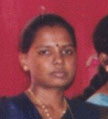
Tamil Makkal Viduthalai Pulikal, previously known as the "Karuna Group", is a political party in Sri Lanka. It was formed by Karuna Amman, a former leader of the Liberation Tigers of Tamil Eelam, after he defected from the organization in 2004. Initially a paramilitary group that helped the Sri Lankan Government fight the Tamil Tigers, the TMVP was registered as a political party in 2007. Under deputy leader Pillayan, they contested their first provincial elections in 2008, winning a majority in the Eastern Provincial Council. Members of the TMVP continue to carry arms under the auspices of the Sri Lankan government, which they claim are for their own safety from the Tamil Tigers, who carry out repeated attacks against them. The group is believed to be working with the Sri Lankan Army. They have been accused of human rights violation by local and international human rights organization.

The Eelam People's Democratic Party (EPDP) is a Sri Lankan political party and a pro-government paramilitary organization. It is led by its founder Douglas Devananda.

The Eastern Province is one of the nine provinces of Sri Lanka, the first level administrative division of the country. The provinces have existed since the 19th century but did not have any legal status until 1987 when the 13th Amendment to the Constitution of Sri Lanka established provincial councils. Between 1988 and 2006 the province was temporarily merged with the Northern Province to form the North Eastern Province. The capital of the province is Trincomalee. Kalmunai is the largest and most populous city of Eastern Province.
Krishanti Kumaraswamy, also spelled Krishanthi Kumaraswamy, was a Tamil woman in Sri Lanka who was raped and murdered on 7 September 1996 by six Sri Lankan Army soldiers; the effort to bring her assailants to justice became a cause célèbre as a part of the protest against atrocities committed by the Sri Lankan Army during the Sri Lankan Civil War.
Human rights in Sri Lanka provides for fundamental rights in the country. The Sri Lanka Constitution states that every person is entitled to freedom of thought, conscience and religion, including the freedom to have or to adopt a religion or belief of his choice. And, that every person is equal before the law.
Sri Lankan Tamil militant groups rose to prominence in the 1970s to fight the state of Sri Lanka in order to create an independent Tamil Eelam in the north of Sri Lanka. They rose in response to the perception among minority Sri Lankan Tamils that the state was preferring the majority Sinhalese for educational opportunities and government jobs. By the end of 1987, the militants had fought not only the Sri Lankan security forces but also the Indian Peace Keeping Force. They also fought among each other briefly, with the main Liberation Tigers of Tamil Eelam (LTTE) rebel group dominating the others. The militants represented inter-generational tensions, as well as the caste and ideological differences. Except for the LTTE, many of the remaining organizations have morphed into minor political parties within the Tamil National Alliance, or as standalone political parties. Some Tamil militant groups also functioned as paramilitaries within the Sri Lankan military against separatist militants.
Vinayagamoorthy Muralitharan is a Sri Lankan politician and former militant. Formerly a fighter for the Tamil separatist group, the Liberation Tigers of Tamil Eelam (LTTE), for over 20 years, Muralitharan later rose to prominence after defecting from the LTTE and forming the Tamil Makkal Viduthalai Pulikal (TMVP), a breakaway faction of the LTTE.
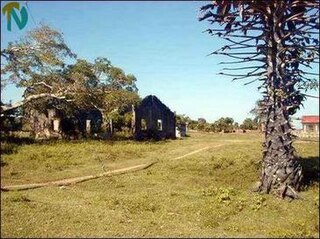
Kumarapuram massacre refers to the mass murder of 26 Sri Lankan Tamil civilians by the Sri Lankan Army soldiers on 11 February 1996. The victims included 13 women and 9 children below the age of 12. Further 28 civilians were severely injured as well. The event took place in a village called Kumarapuram, located in the eastern district of Trincomalee. It was a notable mass murder of civilians since the resumption of armed conflict between rebel forces and Sri Lankan armed forces since April 1995 during the Sri Lankan civil war. The then-government arrested a number of soldiers and home guards who allegedly carried out the massacre. A court case was started on 2004. On 27 July 2016, the court acquitted six former Army Corporals who were accused of the massacre after they were found not guilty.
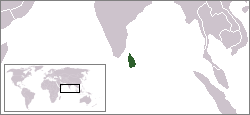
The Allaipiddy massacre or Allaipiddy murders refers to the May 13, 2006 killing of 13 minority Tamil civilians in separate incidents in three villages on the islet of Kayts in northern Sri Lanka.
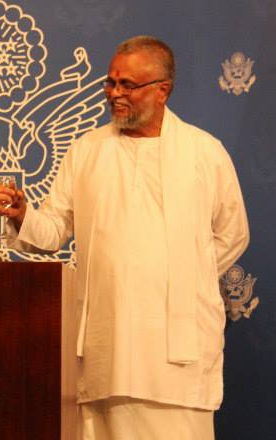
Kathiravelu Nythiananda Devananda, commonly known as Douglas Devananda, is a Sri Lankan Tamil politician, Cabinet Minister and leader of the Eelam People's Democratic Party. Originally a Sri Lanka Tamil militant who fought against the Sri Lankan government for an independent Tamil Eelam, he became a pro-government paramilitary leader and politician. Due to his strong opposition to and vocal criticism of the rebel Liberation Tigers of Tamil Eelam, they unsuccessfully tried to assassinate him over 10 times. Devananda is a proclaimed offender in India and is wanted on charges of murder, attempt to murder, rioting, unlawful assembly and kidnapping. He was sworn in as Minister of Fisheries and Aquatic Resources on 22 November 2019.
Militant use of children in Sri Lanka has been an internationally recognized problem since the inception of the Sri Lankan civil war in 1983. The primary recruiters of under the age of 18 children are the rebel LTTE movement and the Karuna group, a break-away faction of the LTTE working with Sri Lanka Forces. Human Rights Watch criticized that threats and intimidation were used by the LTTE to force Tamil families in Sri Lanka to furnish children for military duty. When families reject, their children are sometimes kidnapped at night from their homes or forced recruited while walking to school. Parents who refuse to allow their children to be recruited suffer retaliation by the Tamil Tigers, which may include violence or detention.

Nadarajah Raviraj was a Sri Lankan lawyer and politician who served as Mayor of Jaffna in 2001 and a Member of Parliament for Jaffna District from 2001 to 2006. A member of the Tamil National Alliance, he was shot dead on 10 November 2006 in Colombo.
The University Teachers for Human Rights (Jaffna) or UTHR(J) was formed in 1988 at the University of Jaffna, Jaffna, in Sri Lanka, as part of the national organization University Teachers for Human Rights. Its public activities as a constituent part of university life came to a standstill after the assassination on September 21, 1989 of Rajini Thiranagama, a key founding member, for which the group blamed the LTTE.
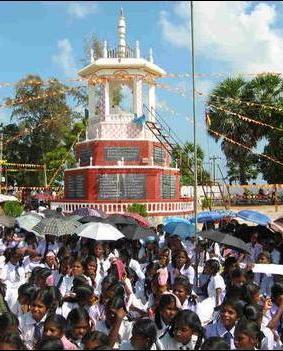
On June 12, 1991, 152 minority Sri Lankan Tamil civilians were massacred by members of the Sri Lankan military in the village Kokkadichcholai near the eastern province town of Batticaloa. The Sri Lankan government instituted a presidential commission to investigate the massacre. The commission found the commanding officer negligent in controlling his troops and recommended that he be removed from office, and identified nineteen other members of the Sri Lankan military to be responsible for mass murder. In a military tribunal that followed in the presidential commission in the capital city of Colombo, all nineteen soldiers were acquitted.
2006 murder of TRO workers refers to the incident of abduction of seven Tamils Rehabilitation Organisation (TRO) employees who were tortured and executed by the TMVP paramilitary group. One employee Premini Thanuskodi was gang raped and murdered.
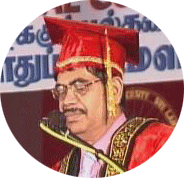
Sivasubramaniam Raveendranath is a Sri Lankan Tamil academic and the Vice-Chancellor of the Eastern University of Sri Lanka. He disappeared after attending a conference on 15 December 2006 in a high-security zone in Colombo and was last seen leaving the conference after receiving a telephone call. His current whereabouts are unknown and his family have claimed that they believe that he has been killed.
Tens of thousands of people have been disappeared in Sri Lanka since the 1980s. A 1999 study by the United Nations found that Sri Lanka had the second highest number of disappearances in the world and that 12,000 Sri Lankans had disappeared after being detained by the Sri Lankan security forces. A few years earlier the Sri Lankan government had estimated that 17,000 people had disappeared. In 2003 the Red Cross stated that it had received 20,000 complaints of disappearances during the Sri Lankan Civil War of which 9,000 had been resolved but the remaining 11,000 were still being investigated. Amnesty International reported in 2017 that the disappeared persons in Sri Lanka could be between 60,000 and 100,000 since the late 1980s.
Sivanesathurai Chandrakanthan is a Sri Lankan politician who served as Chief Minister of the Eastern Province of Sri Lanka. He is also the leader of the Tamil Makkal Viduthalai Pulikal (TMVP), a political party in Sri Lanka. A former armed fighter of the rebel Liberation Tigers of Tamil Eelam organization, Chandrakanthan broke away from the Tamil Tigers along with Karuna Amman in April 2004, and became the deputy leader of the breakaway faction, renamed as the TMVP.
Content from the United States diplomatic cables leak has depicted Sri Lanka and related subjects extensively. The leak, which began on 28 November 2010, occurred when the website of WikiLeaks—an international new media non-profit organisation that publishes submissions of otherwise unavailable documents from anonymous news sources and news leaks—started to publish classified documents of detailed correspondence—diplomatic cables—between the United States Department of State and its diplomatic missions around the world. Since the initial release date, WikiLeaks is releasing further documents every day. 3,166 of the 251,287 diplomatic cables obtained by WikiLeaks are from the US Embassy in Colombo, Sri Lanka.
Sexual violence against Tamils in Sri Lanka has occurred repeatedly during the country's long ethnic conflict. The first instances of rape of Tamil women by Sinhalese mobs were documented during the 1958 anti-Tamil pogrom. This continued in the 1960s with the deployment of the Sri Lankan Army in Jaffna, who were reported to have molested and occasionally raped Tamil women.
